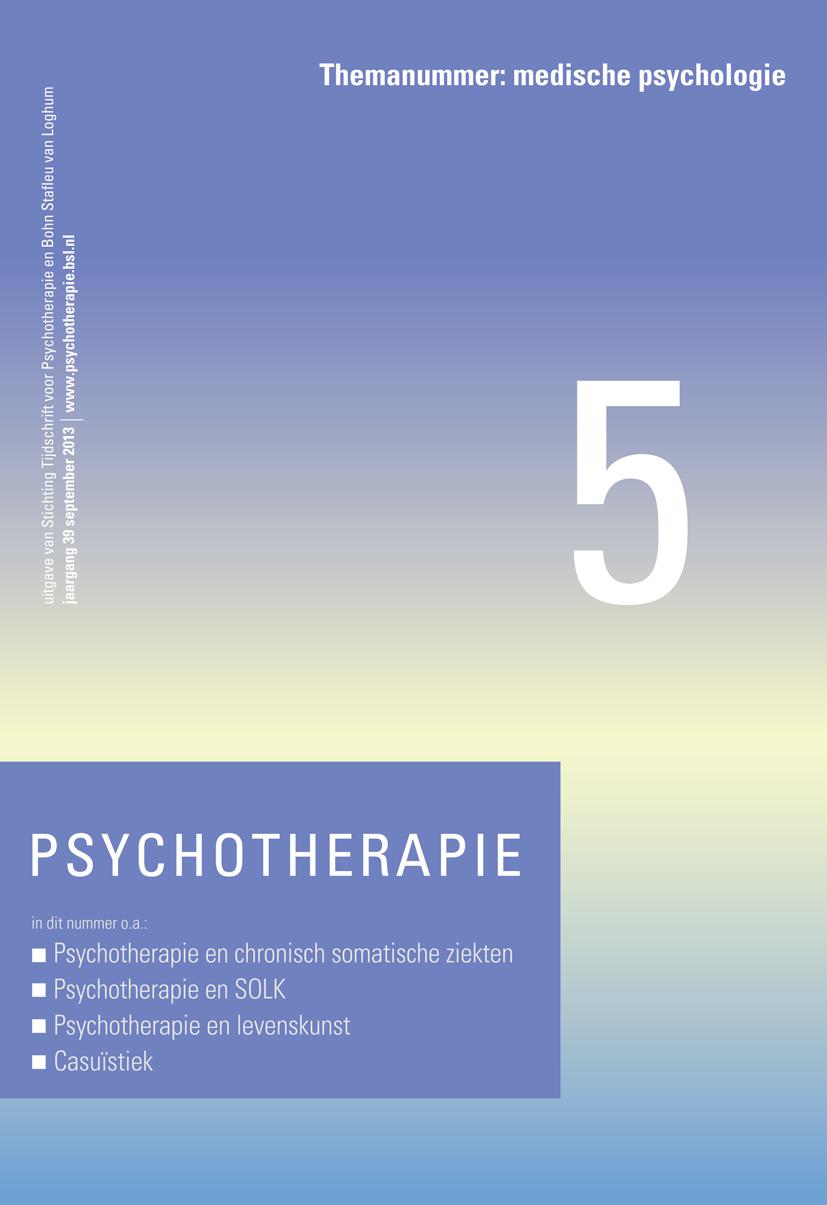Jan Jaspers
Psychotherapy for people suffering from a serious chronic-somatic illness should take care of certain specific illness-related problems. This article describes some generally relevant topics, that always need attention in illness-related psychotherapy: the role of education, self-management issues, problems concerning needed lifestyle changes, adaptation-related problems, the complexity of coand multimorbidity, as well as the issue of ‘delivery to a medical context’.
Iris Keuning Martina Bühring
In the treatment of somatoform disorders and somatic insufficiently explained medical complaints, it is a challenge to bridge the gap between somatic-medical care-perspectives and psychological care-perspectives. Many patients tend to ‘shop’ for medical care, because they find no answers to their questions and complaints. This article recommends and describes the use of a biopsychosocial model and the offering of multidisciplinary treatment for this type of patients. Information is offered about diagnostic and etiological issues, patient ‘profiles’ (light, medium, serious complexity and duration), stepped care treatment, as well as communication and attitude issues.
Claudia Emck
In the psychological treatment of people with chronic-somatic illnesses, the use of physical movement interventions (offered by the psychologist/psychotherapist) can be of interest. Two points of view from the field of psychomotor therapy are presented: actionoriented (concerning bodily condition) and experience-oriented (concerning self- and body-image). Aspects of movement diagnostics and options for intervention are described. Interventions are classified in terms of structure, physical proximity, and physical exertion. Four intervention options are elaborated (influencing respectively tension regulation, mood, body exprience, and emotion and behaviour). The article is illustrated by a case.
Grieteke Pool
Currently cancer is the first cause of death in Western society, but also many patients survive, due to improved treatments. During the past 30 years psycho-oncology has grown from a non-issue to an acknowledged and important aspect of cancer-rehabilitation. Psychological adaptation to cancer is a complex process, where daily hassles go along with existential concerns. Depending on the phase of disease treatment outcome, the patient may struggle with loss of health, loss of control and with anxiety. Some patients search for psychological help. In such case it is important that the psychologists has appropriate knowledge of medical and psychological aspects of cancer. This article covers the following topics: the emergence and current status of psycho-oncology, the type of psychological problems in the context of oncology, the status quo of scientific intervention studies, and the current availability of psycho- oncological care in The Netherlands.
Gerben Westerhof
Suffering always more or less characterizes physical and mental problems. In recent years, scientific attention has started to focus also on positive aspects of human functioning in the context of severe conditions (‘positive psychology’), such as: competence, recilience, experience of wellbeing, the role of values and the attribution of meaning. In psychological treatment these aspects can be fostered; and thus they can promote the ‘art of living’, which means the capacity to manage a personal balance between difficulty or misfortune on the one hand, and keep an eye on what is good, or going well on the other.
Frank Wiersma
This case study describes a man suffering from an eating disorder, eating slowly as well as a social eating-phobia; his mood is dysthymic. In the etiology a combination of attachment problems, family problems, serious disease of the father, shame, guilt and mourning play a role. The case illustrates the importance of medical recognition and credibility, for the interpretation of complaints, as well as for the motivation of the client to reflect on his situation and ‘illness representation’, and to participate in psychological treatment. The introduction of the case offers general information on the role of eating and eating problems in our lives and in the context of illness.
Annelies Kwast
This case study concerns a man who was confronted with melanoma, and thus with the relation between body and mind, with vulnerability and with finiteness. Although existential issues may become very urgent in such circumstances, they also can bring a ‘vitalizing’ influence. The patient, a quite rational man, was forced to pay attention to his anxiety, emerging sadness and other emotions. The quite compact intervention process (five sessions) was structured according to three aims: handling the situation (structure), processing unknown and intense emotions (regulation), and reconsidering the personal life story (integration). In the conversations Yalom’s ‘existential concerns’ appeared of great value (isolation/ connectedness, freedom/responsability, life/death, meaning/ meaninglessness). The case describes, in the presence of loss and grief, the psychological change, development and unfolding where this man has gone through in the course of a few months.

